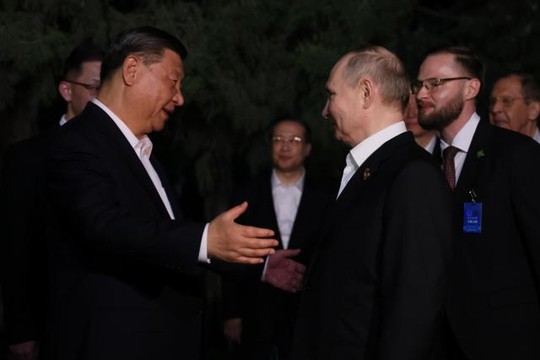Russian President Vladimir Putin and China President Xi Jinping pledged a “new era of strategic partnership”.
Photo: Xinhua
This is a summary of an article published by ‘Foreign Policy’, with the subheading: "The Sino-Russian partnership is tighter than the Sino-Soviet one, with no reason for a split any time soon."
In December 1949, China’s paramount leader, Mao Zedong, traveled to Moscow for his first state visit abroad. The two-month visit culminated with Mao signing a 30-year friendship treaty with his Soviet counterpart, Joseph Stalin. However, this quasi-alliance only lasted about one decade. In 1961, Beijing officials denounced Soviet communism as the work of “traitors,” and an undeclared Sino-Soviet border war erupted in 1969. Later, in 1971, China switched sides by aligning with the United States.
A similar collapse of Sino-Russian ties and switch of alignment seems much less likely today. When Russian President Vladimir Putin said in March that Russia’s relationship with China was at its “best,” he was not expressing mere propaganda. It is actually true. Indeed, by comparing today’s Sino-Russian ties to the past Sino-Soviet alignment along five key factors... it becomes obvious that the Beijing-Moscow axis is stronger today on all accounts.
- First and foremost, the Beijing-Moscow axis now rests on a more solid geopolitical foundation.
- Second, whereas Soviet economic and technical aid dominated the Sino-Soviet friendship phase, Beijing and Moscow have formed an economic relationship over the course of the past decade that builds on the complementary nature of their economies.
- Third, ideology mattered during the Cold War... It is difficult to imagine ideological differences leading to a breakdown of Sino-Russian relations today.
- Fourth, leadership matters in foreign policy, and the dialogue between the top leadership in Beijing and Moscow is much stronger today than it was during the Cold War.
- Fifth, the institutional links between China and Russia are both wider and deeper today than during the Cold War.
The United States was only able to play the China card against the Soviet Union because of the Sino-Soviet split one decade earlier, with Beijing perceiving Moscow as a considerable security threat. The Sino-Soviet alliance unraveled from within — and not because the United States applied outside pressure or offered an irresistible deal. While the Sino-Russian relationship is unlikely to ever be perfectly stable, it is difficult to see anything like the Sino-Soviet breakdown threatening their alignment. In stark contrast to the Cold War, the current Beijing-Moscow axis rests on a solid geopolitical foundation with strong economic ties, freedom from ideological friction, strong relations between the two countries’ leaders, and a well-established web of bilateral and institutional links.
read more in our Telegram-channel https://t.me/The_International_Affairs

 11:26 11.10.2024 •
11:26 11.10.2024 •























